by M. C. Jennings | Aug 20, 2018 | Academics, COBA Faculty, Current Students, Faith Infusion, Uncategorized
This July, the COBA classroom moved around the world to Leipzig, Germany with professors Don Pope and Dennis Marquardt leading the way. Students received course credit in Cross Cultural Organizational Behavior and Global Operations Management. We asked Dr. Pope to tell us an overview of their trip. We hope you enjoy the second installment of our four part blog series on the 2018 travels of the COBA Study Abroad program.
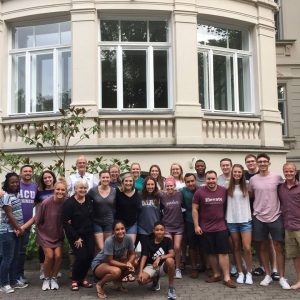
The group poses in front of their home away from home in Leipzig
What made Leipzig a unique place to study?
Leipzig is a mid-sized German city with a long and proud history. It is not a tourist destination. You would have to search for a souvenir shop. It is historically important because it was the home of Bach, among other well known German musicians and writers. Martin Luther lived in the nearby town of Wittenberg. Leipzig was the center of the ‘quiet revolution’ uprising that brought down the iron curtain in 1989. The German language adds a dimension to a study abroad experience that an English-speaking location cannot provide. But, enough English is spoken to allow one to get around without great difficulty.
Were you able to visit any companies or work on projects with companies in other countries?
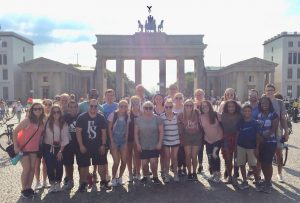
At the Brandenburg Gate in Berlin
We toured the BMW assembly plant in Leipzig which is very modern, is automated, and operated with great German efficiency and attention to sustainability.
Did you take the students on any sight seeing tours?
We took the students to visit Wittenberg where Martin Luther nailed his statement of protest to the church door 501 years ago, at great personal risk to his life. We also did a group tour of Berlin and many of the sites there, including the Berlin wall and memorial museum for Jews who lost their lives in the Holocaust. We traveled to Weimar and the nearby site of the World War II Nazi concentration camp, Buchenwald. We saw a place of great horrors and felt the weight of the suffering that occurred there. We saw the 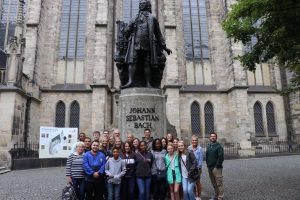 ovens that burned the bodies of those killed, the hooks on the walls where people were hung, the shoes of the victims, many of them children. We saw the memorial to the living – those who survived. The memorial plaque is simple in design, and heated to a living temperature of 98.6 all through the cold winters.
ovens that burned the bodies of those killed, the hooks on the walls where people were hung, the shoes of the victims, many of them children. We saw the memorial to the living – those who survived. The memorial plaque is simple in design, and heated to a living temperature of 98.6 all through the cold winters.
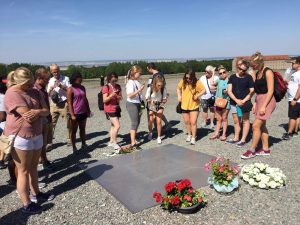
Visiting the Buchenwald Concentration Camp Memorial
What is it like to be able to spend so much time with students in another country? How does it differ than being in a classroom setting in Abilene?
Spending time in other countries helps to open your mind, eyes and heart to the world and appreciate the lesson that God tried to each Jonah long ago – that He loves and cares for all people everywhere.
What were your favorite moments/experiences of the trip? 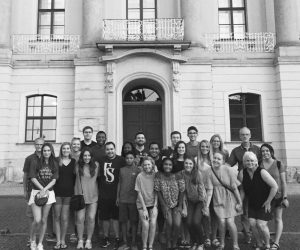
The trips mentioned above, and getting to hang out with the students and get to know them better.
If students could only learn one thing, what do you hope they learned?
That the world is a much bigger place than the little bubble that most of us live in, and that we need to learn to live and function in a global community.
by M. C. Jennings | Aug 14, 2018 | Academics, COBA Faculty, Current Students, Uncategorized
This summer, COBA students and professors traveled the globe learning more about how globally connected we are through business and about the people and cultures on the other side of the world. This is the first of a three part blog series on the 2018 travels of the COBA Study Abroad program. We hope you enjoy living vicariously through these stories as much as we have!
In June, professors Sarah Easter and Mark Phillips led a group of students to Oxford, England offering course credit in International Business and Professional Development and Life Design. We asked Dr. Easter and Dr. Phillips a few questions to learn more about this fantastic experience and why other students should sign up to go in the future.

What made Oxford a unique place to study?
Oxford is a beautiful city, rich with stunning architecture, history and culture. As the home to Oxford University and its many colleges, there are lots of different university buildings, churches and museums to visit as well as numerous green spaces and parks. Plus, it’s very walkable and a short train ride to London and beyond.
Were you able to visit any companies or work on projects with companies in other countries?
In the Oxford area, we took a tour of the MINI Cooper plant and Oxfam International, a leading UK-based charity, to learn about their international operations. We also took a day trip to London to learn about Sodexo’s corporate social responsibility initiatives as a global catering service provider; experience Siemen’s The Crystal, one of the world’s most sustainable buildings; and have lunch with an alum based in London to learn about her experiences living and working abroad.
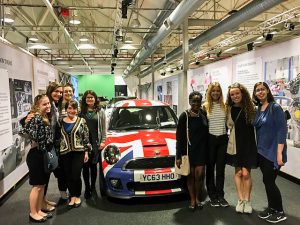
Our highlight excursion was a four-day trip to Slovenia where we met with the director for environmental protection for the city of Ljubjlana. She shared the city’s many initiatives focused on environmental sustainability including making the main city center largely car free; Ljubljana won the Green City Capital award for 2016 from the European Commission. We also met with professors at the University of Maribor to learn about the Slovenian economy, and with a leader for a faith-based organization focused on youth outreach in Slovenia to learn about enacting faith in a largely secular culture. It was a fantastic trip in a beautiful and friendly country!
Did you take the students on any sight seeing tours? 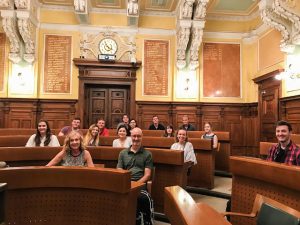
We wanted students to experience local culture in Oxford as much as possible during our short time there. So, we incorporated some local activities into our agenda, including punting on the River Cherwell (http://cherwellboathouse.co.uk/punting/) and going to an evensong service (a choral-based church service) at Christ Church. While in Slovenia, we took a city walking tour of the capital, Ljubjlana, as well as a day trip to the popular Lake Bled to experience the emerald blue lake and visit the Bled castle.
What is it like to be able to spend so much time with students in another country? How does it differ than being in a classroom setting in Abilene?
We really enjoyed getting to know the students in a much more personal manner than is typically possible in a classroom setting in Abilene. Not only did we interact with students in the classroom on a daily basis, but we also had the opportunity to live with and hang out with students as well. The Phillips had the students over to their apartment in smaller groups for dinner and I (Sarah) organized dessert outings around Oxford with them, which really contributed to us building relationships with them in a more relaxed (and hopefully fun) format.
What were your favorite moments/experiences of the trip?
Sarah: There are too many to name but a few of my favorite experiences include: getting to know the students via yummy dessert outings around Oxford; going punting as a group on the River Cherwell; and our excursion trip to Slovenia.
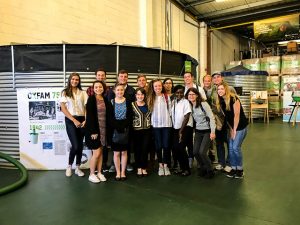
Mark: Working with our students on their Life Design plans. They have so many opportunities and it was wonderful to watch as they wrestle with their options.
If students could only learn one thing from this experience, what do you hope that would be?
Sarah: My hope for students is that studying abroad will instill a true appreciation for other national cultures (and how complex and varied they are) as well as to spark a desire to seek and serve others throughout the world – wherever God calls them to be in the future.
Mark: Texas and even the United States make up a tiny fraction of the world. As much as we love it here, I hope they began to get a glimmer of the amazing possibilities out there.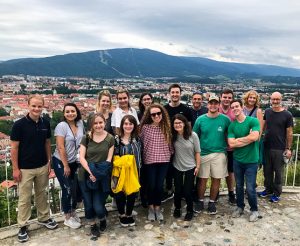
We would strongly encourage students even thinking about study abroad to apply (there are scholarship opportunities available!). It is truly a life changing experience that will not only provide students with much more of a global mindset that today’s employers are looking for, but it will also affect them personally and provide them with a more well-rounded view of the world in which they live.
Students can learn about upcoming trips for the summer of 2019 at fall study abroad interest meetings. Check your COBA newsletter for dates!
by Hanna Roberts | Jul 17, 2018 | Academics, Careers In..., Current Students, Student Spotlights, Uncategorized
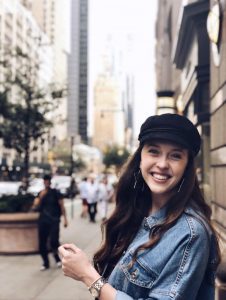 Ever since she was a little girl, Sloan Polvado has had an obsession with fashion – specifically, shoes. Sloan has always wanted to work in the fashion industry and this summer has had the opportunity to fulfill that dream.
Ever since she was a little girl, Sloan Polvado has had an obsession with fashion – specifically, shoes. Sloan has always wanted to work in the fashion industry and this summer has had the opportunity to fulfill that dream.
Sloan, a junior marketing major from Sugar Land, is interning with Steve Madden in New York City in the production department. She aids in preparing the production schedules, helping set up timetables that allocate Steve Madden resources to manufacture and sell their shoes. Sometimes, Sloan will get to try on the new designs and give the design team feedback on them and recommendations for adjustments.
Sloan has loved getting to learn more about the fashion industry. “It has been awesome to see all of the work that goes into creating a shoe – the different materials and styles as well as the numbers and math – and taking it from design to a store,” says Sloan.
The Steve Madden internship program itself has also taught Sloan a lot. “Knowing that I will be contending with talented and driven people like the other interns in this program for a job after graduation has taught me that I have to do everything I can to make myself as competitive as possible,” she noted. Of the thirty summer interns, Sloan is the only one from the south and has found it interesting to compare ACU and her college experience with the other interns. The program has helped Sloan realize how competitive it can be in the professional world and the work that goes into distinguishing yourself when looking for internships and jobs. Outside of gaining practical experience, she has loved connecting with the people around her. She has also had the opportunity to meet Steve Madden himself, who loves getting to know and interacting with his interns. “Steve is a really fun and approachable guy,” according to Sloan. “He will always look at your shoes before making eye contact with you.”
She is excited to return to Abilene with new knowledge and a new motivation to prepare for a job after graduation. “I have learned so much valuable information about the fashion industry, what it is like to work in a major company, and networking connections with those around her – oh, and the free shoes aren’t too bad either.”
by M. C. Jennings | Jun 28, 2018 | Academics, Current Students, Faith Infusion, Social Entrepreneurship, Uncategorized
Students often take advantage of summer courses to receive credit in a compressed amount of time and effectively use block tuition. Those summer courses can sometimes be a little more creative in the way they are taught – even in deciding the location for the class. MGMT 320: Social Entrepreneurship is no exception to that rule. Social Entrepreneurship is taught at City Square in downtown Dallas by Dr. Laura Phillips over the course of five days. Business students are not the only students who take the class. Phillips says, “The social entrepreneurship course is appropriate for business majors and non-business majors alike. We’ve had students in the class who are studying art, English, architecture and political science – just to name a few. It’s also relevant for students at different points in their academic career. I’ve had students who just finished their first year of college in the class as well as students who are taking it as their very last class. It may seem overwhelming to squeeze an entire class into a week, but it’s an engaging and inspiring week!” We asked a couple of the students who completed the course to tell us a little about why they chose to take the class and what they took away from the week.

Ashleigh Price (’18) management major from Sunnyvale, Texas said, “I had one more class I needed to take to complete my degree and was really looking for classes in that last semester that focused on the field I wanted to go in to – poverty and development. It was convenient since I lived in Dallas and I had heard so many great things about it, so I jumped on it!” Jordan Eason, senior accounting major from Keller, Texas said, “I had always wanted to take this class, because I had heard from others that it was a great class. I am also very interested in social entrepreneurship from my time volunteering with various non-profit organizations.”
Tell us a little bit about the format of the class. What was a typical day like?
Jordan: “In the class, we had a lot of guest speakers come to us but we also went on field trips to businesses, too. A typical day included hearing from guests and then engaging in a lot of discussion to process what we were learning.”
Ashleigh: “There is no such thing as a typical day! Every day is special in its own way. The first and last days included a few speakers but we were also taking care of administrative tasks and assignments including group work. On Tuesday through Thursday, however, we had a networking lunch (Tuesday) and breakfasts (Wednesday and Thursday). We were able to sit down with the guest speakers and talk about our passions. We were also able to hear the coolest testimonies of business owners and people who are in prominent positions in large companies like Southwest Airlines and HKS. Every day, we had additional speakers along with the networking. In those sessions, we heard about real life situations and learned applicable skills to apply to our potential business models.”

Cafe Momentum
Tell us about some of the speakers and/or experiences that stood out to you?
Jordan: “We visited a restaurant in Dallas called Café Momentum and heard from the entrepreneur that started it, Chad Houser. At his café, he employs and trains teens that have been in juvenile detention. His hope is for them to be placed in a job and leave the café once they finish the program. We actually were able to eat at the restaurant, which was named one of the top restaurants in Dallas. It was great to hear him talk about his mission and the passion he had for what he was doing.”
Ashleigh: “One of my favorite speakers was Todd Spinks who works for Southwest and possessed a love for people, wanting to unite them to work for good. Another was Chad Houser who runs Cafe Momentum which helps to rehabs kids, get them jobs, and gets them off the streets. There were others that I loved (and honestly all of them were really great) but these two people had a lot of impact on me.”
What was your favorite thing about the class?
Jordan: “My favorite thing about the class was getting to have conversations with the guest speakers. On two of the days of class, we were able to have breakfast with them. There was one guest to a table of 3-4 students, so we were able to have great conversations and ask them questions. The guests were all so kind to take that time out of their day to talk with us.”
Ashleigh: “The connections made and the subjects talked about – any and all things having to do with social enterprise.”
What surprised you the most about the class or any of your experiences in the class?
Jordan: “I learned a lot in this class, specifically of ways to help people without hurting them. It was surprising that different ways of poverty alleviation were useful in certain areas but not in others. We really learned how there is not a one size fits all solution and that was echoed by speakers through the week.”
Ashleigh: “I was expecting it to be a lot of work but it wasn’t like that at all. It was constructive and thought provoking. It reminded me a lot of Leadership Summit. It was basically a mini LS but it focused on doing good rather than leadership.”
Ashleigh went on to say that the class has, “Changed how I view poverty and what people in those situations need versus what I think they need. They know what they need better than I ever could. It showed me how much more diverse I need to make my friend circle. The class also confirms my love of this career path and it has given me tools to use in the future at either my own business or in a position with a company or organization.”
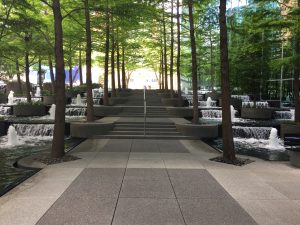
Social Entrepreneurship at CitySquare is pushing students to think outside the box and time again, they state how much they love the class. How about the professor? We asked Dr. Phillips a few questions about the course as well.
What is your favorite thing about teaching the class?
Dr. Phillips: “Almost every day one of the students makes a comment to me about how a particular speaker or a field trip has ‘blown their mind’. I think that’s my favorite thing about teaching the class. Some students are blown away by the inequalities that exist around them that they’ve never noticed before. For some students what blows their mind is the variety of creative ways people are using their business to achieve social impact in their community. For other students the most eye-opening aspect of class is the wide variety of backgrounds our speakers come from – the fact that there’s not a prescribed path to social entrepreneurship. I love being able to sit back and watch their eyes open up to a whole new world of possibilities.”
I know you have many speakers that come in to talk to the students. Who are some that have made a big impact on the students?
Dr. Phillips: “This question is hard to answer because the students have different favorite speakers. That’s one of the nice things about bringing in a wide variety. While they may appreciate and learn from all of the speakers, students typically really connect with a handful of our guests and who that is varies from student to student. A couple of speakers who are perennial favorites are John Siburt, President and COO of CitySquare, and Chad Houser, CEO and Executive Chef at Cafe Momentum. Both are charismatic, innovative, and inspiring and they motivate the students to have big dreams.”
What do you hope students will take away from the class?
Dr. Phillips: “I hope that students will leave class with the understanding that they can choose to do good through their business regardless of what that business is. I also hope they leave class with a set of tools and contacts that make them feel empowered and capable of launching a social enterprise – maybe soon, maybe not for 20 years.”
The College of Business seeks to inspire, equip, and connect students to honor God and bless others. We can’t wait to see what these students do to change the world. Any student wanting to learn more about the next offering for MGMT 320: Social Entrepreneurship can contact their academic advisor or Dr. Laura Phillips.
by M. C. Jennings | May 23, 2018 | Academics, COBA Faculty, Current Students, Research, Uncategorized
Dr. Katie Wick has a Ph.D. in economics and teaches classes in microeconomics, macroeconomics, and game theory at ACU. Last semester, Dr. Wick worked on registered replications of two famous social science papers with student Rachael Shudde, whom Dr. Wick has mentored throughout her time at ACU. They were a part of a replication with 24 other universities to test the results of these papers to see if they still held. Dr. Wick and Rachael had just under 400 participants in their section and the meta-analysis of the whole replication had 8,000 participants. Dr. Wick was named Mentor of the Year at ACU’s Undergraduate Research Festival for her work with Rachael.
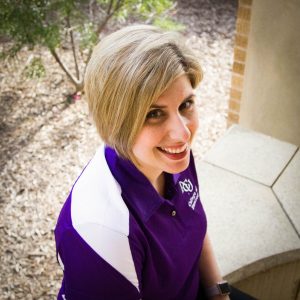
Dr. Katie Wick
The premise of the first paper was on hostility and how people view actions as hostile or not based on whether they were primed with angry words or regular words. The second paper, which was presented at ACU’s research festivals and others, focused on the effects of moral priming against cheating. Participants were presented with a test that asked them to solve twenty matrix equations and then write down the number of matrices that they solved. Only half of the matrices had solutions and participants were asked to solve each one in four minutes. If participants reported solving more than ten matrices and more than four minutes were used to solve problems, then the participant was cheating. Before taking the test, participants had to complete a priming task. The control prime was to write down ten books the participant read in high school and the moral prime, which was being evaluated to see if it had any effect on cheating, asked participants to write down the Ten Commandments. Dr. Wick was particularly interested in this replication at ACU because students are constantly morally primed. There are bible verses on the walls, chapels, and Christian professors who consistently integrate faith into their classrooms. Dr. Wick hypothesized that the moral priming task would not affect the participants at ACU as they are morally primed every day, which turned out to be true.
Beyond guidance through the project, Dr. Wick mentored Rachael through a major life transition. Dr. Wick has known Rachael since she was a freshman at ACU. Rachael approached Dr. Wick wanting to learn more about how to prepare for a Ph.D. in economics. Dr. Wick counseled her to study math, which became Rachael’s first major and has continued to walk with Rachael during her time at ACU. Throughout the project, Dr. Wick wanted to prepare Rachael for graduate school. Rachael had the task of taking all 400 experiments and inputting the test into a database for analysis. “I wanted to prepare her for the grunt work she will encounter,” said Dr. Wick. “The leap between undergraduate and graduate school is even bigger than the leap between high school and undergraduate school. It’s not glamorous and very hard.” Rachael wrote code to analyze the data, expecting the results to point to the original paper’s hypothesis that the moral prime decreased cheating. “I thought I had coded wrong,” said Rachael. “I was surprised to see that the ACU data contradicted the original results. That is my favorite part of data analysis: when you expect something to happen when you find results that are surprising.”
Rachael presented their findings on the cheating experiment at ACU’s Undergraduate Research Festival and at the Southwestern Psychological Association Conference. Dr. Wick was nominated by Rachael Shudde and won the award for Mentor of the Year at ACU’s Undergraduate Research Festival. “Dr. Wick is awesome and dedicated to research,” said Rachael. “She has a desire to answer questions and is good at designing and interpreting experiments. She is also great at giving feedback and guidance, which was invaluable throughout the research process.” Dr. Wick is grateful for the time she has been able to spend with Rachael and looks forward to seeing what she does during and after school.
by M. C. Jennings | May 14, 2018 | Academics, Alumni Spotlight, COBA Events, Current Students, Faith Infusion, Student Spotlights, Uncategorized
Meet Jonathan Rugamba, one of our newest COBA alumni. Jonathan graduated on Saturday, May 12th, with a double major in accounting and finance. After graduation, he will be returning to his hometown of Kigali, Rwanda. His goal is to build up an equity firm within the next 10 years through which he can channel as many job opportunities as possible for the people of Rwanda.
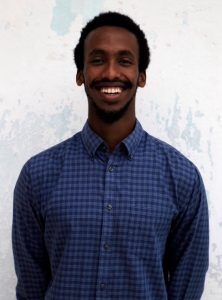
Jonathan Rugamba
Rugamba will be creating the start-up with a team of 5 of his “fellows” back home. Three of the team members build software and the other teammates will work to find clients to purchase the software. He said the start-up is still struggling to get off the ground but they hope for the best in the future. When asked how being a Christian will mold his work with co-workers and clients, Jonathan said that “I think most of my Christian values of love and unity will be vital in forming a strong team bond.”
When asked how the education and experiences at ACU and in COBA have helped him prepare for life after graduation, Jonathan stated, “Future is always the future, we can only guess at what it truly holds. We may feel prepared but we can’t certainly be sure. However, I have really gained a lot of knowledge, and that is the best preparation in my opinion. Knowledge never expires but grows.” One of Rugamba’s favorite experiences while in COBA was his time in STAR (the Student Trading and Research class) because it most mimicked the reality of the business world.
Rugamba’s advice to current students who want to follow this same type of work is to find your strength and remember that this is a never-ending journey. He advises incoming freshmen to “Have an end-in-mind, work towards it, love people and try to find the best in them. However, you are the best judge for yourself so the challenge lies in your hands. And above all strive to make sure that one day you will live your dream.”


 ovens that burned the bodies of those killed, the hooks on the walls where people were hung, the shoes of the victims, many of them children. We saw the memorial to the living – those who survived. The memorial plaque is simple in design, and heated to a living temperature of 98.6 all through the cold winters.
ovens that burned the bodies of those killed, the hooks on the walls where people were hung, the shoes of the victims, many of them children. We saw the memorial to the living – those who survived. The memorial plaque is simple in design, and heated to a living temperature of 98.6 all through the cold winters.






 Ever since she was a little girl, Sloan Polvado has had an obsession with fashion – specifically, shoes. Sloan has always wanted to work in the fashion industry and this summer has had the opportunity to fulfill that dream.
Ever since she was a little girl, Sloan Polvado has had an obsession with fashion – specifically, shoes. Sloan has always wanted to work in the fashion industry and this summer has had the opportunity to fulfill that dream.



